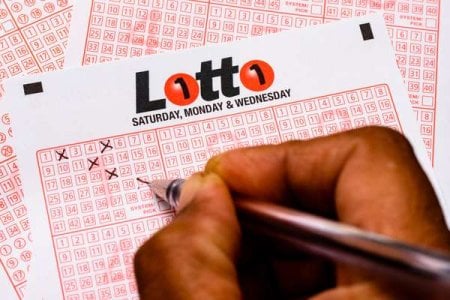Neighbors' Lottery Dream Turns Nightmare: The $5 Million Battle That Could Happen to You!
- Replies 8
Imagine the excitement of winning the lottery – the thrill of suddenly having millions of dollars at your disposal, the dreams of a life without financial worries, and the joy of sharing your good fortune with those closest to you. Now, imagine that euphoria turning into a nightmare, embroiled in a bitter legal battle with someone you once considered a neighbor and friend. This is precisely the cautionary tale that unfolded in a housing commission block, where a $5 million lottery win spiraled into a two-year feud, culminating in a court case that has captured the attention of Australians nationwide.
The story began with jubilation when two elderly residents, Mark Peter Bowling, 76, and Moya Posa, 89, won a staggering $5 million. However, the celebration was short-lived as a former member of their lottery syndicate, Alan Way, took them to court, claiming he was unjustly cut out of the winnings. Mr. Way insisted he had been a contributing member of the group right up until the life-changing victory in August 2022, despite the pair's assertion that he had left nearly a year earlier.
The dispute hinged on the nature of syndicate memberships and the informal agreements that often bind them. Mr. Way presented diary entries as evidence of his regular $20 contributions to the lottery group, but Justice James Hmelnitsky found these entries to be unreliable, stating they were likely not made at the time they purported to be. The court ultimately ruled that Mr. Way was not a member of the syndicate at the time of the win, siding with Mr. Bowling and Ms. Posa.

The roots of the conflict traced back to personal disagreements, including a confrontation over noise and the non-observance of Covid restrictions, which led to Mr. Way's departure from the group. Despite the falling out, Mr. Bowling had extended an olive branch in the form of a $200,000 'gift' to Mr. Way, a gesture that now seems tinged with irony given the subsequent legal wrangling.
The story serves as a stark reminder of the complexities that can arise from communal gambling endeavors, especially when large sums of money are involved. It also highlights the importance of clear communication and formal agreements within lottery syndicates to prevent misunderstandings and disputes.
For our readers at the Seniors Discount Club, this tale is a cautionary one. If you're part of a lottery syndicate or considering joining one, it's crucial to have clear, written agreements about the distribution of any potential winnings. This documentation should outline each member's contribution, the process for purchasing tickets, and the method for dividing any prizes. It's also wise to discuss and document what happens if a member leaves the group.
Moreover, this case underscores the need for transparency and fairness in dealing with windfalls. The way Mr. Bowling and Ms. Posa managed their winnings – distributing money among family in a manner that would allow them to continue receiving social security payments – raises ethical questions about the responsible handling of sudden wealth.
As we reflect on this saga, let's consider the broader implications for our community. How do we ensure that the joy of a lottery win doesn't dissolve into acrimony and legal battles? How do we protect friendships and maintain integrity in the face of unexpected fortune? These are questions worth pondering as we navigate the unpredictable waters of chance and luck.
 We invite you to share your thoughts and experiences with lottery syndicates in the comments below. Have you ever been part of a group that won, and how did you manage the distribution of the prize? Your insights could be invaluable to fellow members looking to avoid the pitfalls that befell the residents of this housing commission block.
We invite you to share your thoughts and experiences with lottery syndicates in the comments below. Have you ever been part of a group that won, and how did you manage the distribution of the prize? Your insights could be invaluable to fellow members looking to avoid the pitfalls that befell the residents of this housing commission block.
The story began with jubilation when two elderly residents, Mark Peter Bowling, 76, and Moya Posa, 89, won a staggering $5 million. However, the celebration was short-lived as a former member of their lottery syndicate, Alan Way, took them to court, claiming he was unjustly cut out of the winnings. Mr. Way insisted he had been a contributing member of the group right up until the life-changing victory in August 2022, despite the pair's assertion that he had left nearly a year earlier.
The dispute hinged on the nature of syndicate memberships and the informal agreements that often bind them. Mr. Way presented diary entries as evidence of his regular $20 contributions to the lottery group, but Justice James Hmelnitsky found these entries to be unreliable, stating they were likely not made at the time they purported to be. The court ultimately ruled that Mr. Way was not a member of the syndicate at the time of the win, siding with Mr. Bowling and Ms. Posa.

Two elderly housing commission residents won $5 million in a lottery, but a former syndicate member sued them for the winnings. Credit: Shutterstock
The roots of the conflict traced back to personal disagreements, including a confrontation over noise and the non-observance of Covid restrictions, which led to Mr. Way's departure from the group. Despite the falling out, Mr. Bowling had extended an olive branch in the form of a $200,000 'gift' to Mr. Way, a gesture that now seems tinged with irony given the subsequent legal wrangling.
The story serves as a stark reminder of the complexities that can arise from communal gambling endeavors, especially when large sums of money are involved. It also highlights the importance of clear communication and formal agreements within lottery syndicates to prevent misunderstandings and disputes.
For our readers at the Seniors Discount Club, this tale is a cautionary one. If you're part of a lottery syndicate or considering joining one, it's crucial to have clear, written agreements about the distribution of any potential winnings. This documentation should outline each member's contribution, the process for purchasing tickets, and the method for dividing any prizes. It's also wise to discuss and document what happens if a member leaves the group.
Moreover, this case underscores the need for transparency and fairness in dealing with windfalls. The way Mr. Bowling and Ms. Posa managed their winnings – distributing money among family in a manner that would allow them to continue receiving social security payments – raises ethical questions about the responsible handling of sudden wealth.
As we reflect on this saga, let's consider the broader implications for our community. How do we ensure that the joy of a lottery win doesn't dissolve into acrimony and legal battles? How do we protect friendships and maintain integrity in the face of unexpected fortune? These are questions worth pondering as we navigate the unpredictable waters of chance and luck.
Key Takeaways
- Two elderly housing commission residents won $5 million from a lottery, but their former syndicate member took them to court over the winnings.
- Justice James Hmelnitsky ruled that the complainant, Alan Way, was not a member of the lottery syndicate at the time of the win, based on diary entries considered not contemporaneous.
- The court found that Mr Way had left the syndicate in 2021 after a dispute, a year before the lottery win occurred.
- Despite receiving a $200,000 'gift' from the winners, Mr Way pursued legal action after discovering the full amount won, which led to the winners moving away and the eventual court battle.







